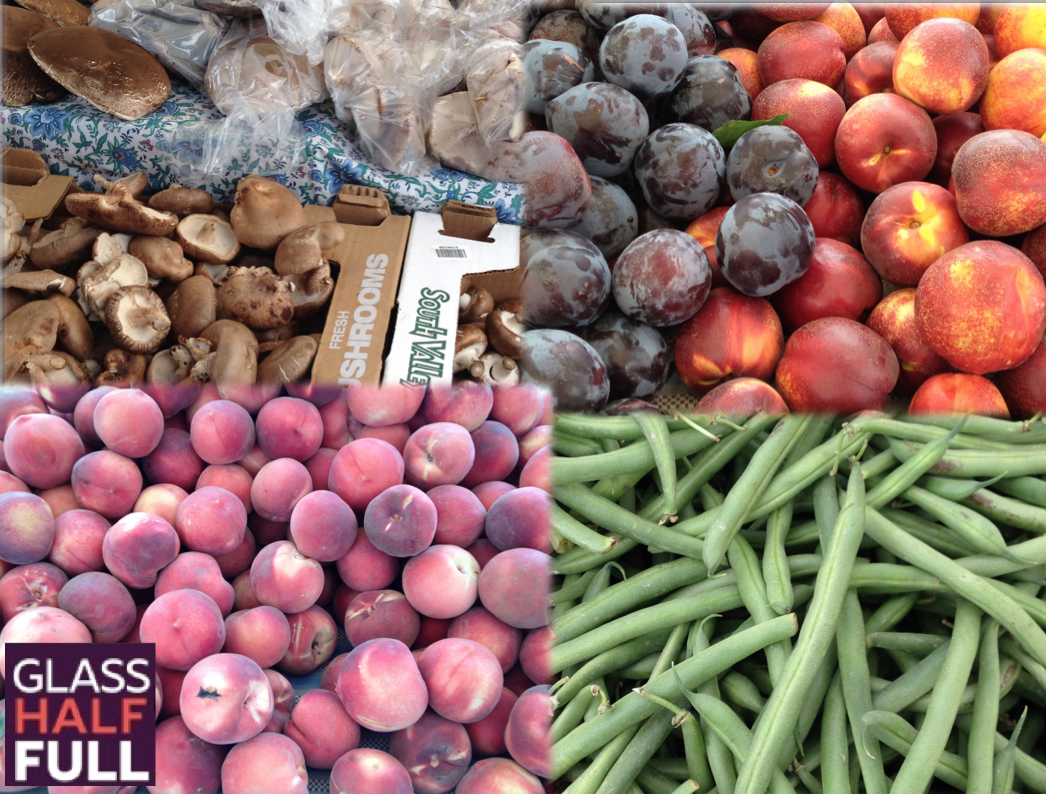This is a continuation of the last podcast episode exploring how food can be the best medicine. In this episode I spoke with Jill Nussinow, The Veggie Queen, at the Farm to Fermentation Festival. Jill is a Registered Dietician and author of cookbooks and DVDs. Her most recent book is Vegan Under Pressure: Perfect Vegan Meals Made Quick and Easy in Your Pressure Cooker.
This podcast is for anyone interested in adding more plant-based dishes to their diet or is curious about fermented foods.
Transcript
welcome to glass half full with leslie krongold she shares her stories experiences and knowledge of living and coping with a chronic health condition learn about tools and resources and hear inspirational interviews that help you to live a life filled with quality and dignity with two decades of support group leadership leslie’s ready to help you make lemonade out of life’s lemons are you ready i hope you don’t mind but this episode is a continuation of the last episode exploring food as medicine maybe you saw the live stream on facebook this past weekend as i visited the farm to fermentation festival i couldn’t help but continue the discussion because i had a chance to interview the veggie queen it’s not everyday you meet with veggie royalty right so the queen was on hand talking about veggies and fermentation and all that good stuff and i didn’t want to keep you in suspense so you have this podcast as the second part of food as medicine before you meet the veggie queen jill nussenau i want to cover a few things first what is fermentation according to my friend wikipedia fermentation in food processing is the process of converting carbohydrates to alcohol or organic acids using microorganisms you know like yeasts or bacteria under anaerobic conditions fermentation usually implies that the action of microorganisms is desired according to sandor katz who has written several pivotal books about fermented foods and is thought to be the modern revivalist of fermentation eating a variety of live fermented foods helps promote diversity among microbial cultures in our bodies katz has aids acquired immune deficiency syndrome and considers fermented foods an integral part of his healing process the second item i’d like to briefly review is the idea of eating a plant-based diet jill being the veggie queen is more than qualified to talk about this and she will i just happened to read a lot of health related newsletters and wanted to prep you with a few tidbits for example one newsletter i receive is the women’s nutrition connection this is a monthly published by the wild cornell medical college and in last year’s june issue they discussed the five top foods for brain health foods that can boost memory and thinking and help prevent cognitive decline and those foods are berries the study included strawberry and blueberries nuts especially walnuts cruciferous vegetables and those are or they include cabbage broccoli cauliflower brussels sprouts kale arugula watercress and bok choy and then the fourth top food for brain health is cocoa powder and spinach in the july 2015 issue of this same newsletter there was an article about the powerhouse vegetables revealed by the cdc the centers for disease control and prevention and the study they were involved in measure nutrients in a variety of vegetables and they found 20 of these vegetables have the highest nutrient dense scores and the number one powerhouse veggie is you ready you ready can you guess what do you guess what i i know half of you are thinking kale but it’s not kale it’s watercress watercress i bet you don’t eat a lot of that okay so the others on the list but not necessarily in the order of their scores are and maybe it is in the order of their scores they just didn’t reveal that in the article uh chinese cabbage charred beet greens which are so good cooked i don’t need any of this stuff raw really spinach chicory leaf lettuce parsley romaine lettuce collard greens turnip greens mustard greens and knives chives kale dandelion greens red pepper arugula broccoli and pumpkin okay you ready for another tidbit eating tree nuts such as almonds brazil nuts cashews hazelnuts macadamias pecans pine nuts pistachios and walnuts are associated with lower body weight and a lower risk of cardiovascular disease and in the january 2015 issue of tufts university’s health and nutrition letter there’s an article about one of my favorite foods hummus it’s a staple of my diet it’s very easy to eat when you have chewing issues okay so the article is not really just about hummus it’s really it explains how garbanzo beans and black-eyed peas are a type of legume known as pulses pulses are known to improve cholesterol levels they are complex carbohydrates and have insoluble and salt insoluble fiber which helps with digestion and prevents constipation and finally you wondered how long i could keep this up right okay in the september 2016 issue that’s the current issue of self-healing by dr andrew weil you know the the good doctor with the beer the older chubby guy um well the good doctor promotes the seven superfoods for autumn and you’ll have to do your own research to find out why these foods are considered super but these superfoods are kale sweet potatoes brussels sprouts apples cranberries pumpkin and pomegranate and a pumpkin latte from starbucks would not qualify as a superfood at least i don’t think so those are my food facts for you the next few podcast episodes will explore topics such as the role animals can play in our lives and i’ve interviewed a woman with ms who has a service dog i have another interview with a woman who works with a voice coach and calls herself a musical philanthropist she raises money for a local non-profit organization and and seeing is her passion and then her i have another episode i’m working on that i’m calling reefer modness
you m-o-d-n-e-s-s figure out that
so as i previously mentioned i was at the farm to fermentation festival last week it was my fourth time attending this unique event in santa rosa california and four years ago may have been the first time i saw the veggie queen jill nussenau or it may have been the first time i may have been at the annual sonoma county mushroom camp we have some pretty cool events in northern california one how jill is a registered dietitian a culinary educator and has published books and dvds about cooking and she was kind enough to sit with me in the hallway for an interview before her presentation in the festival i first wanted to ask her what she recommends for people who really do want to make their diets more plant-based but are often bewildered on where and how to start well i think the main thing is to really look at what you’re eating that’s not plant-based and say oh what could i eat instead or just fill up with the plant foods the beans the grains the uh vegetables and fruit and nuts and seeds and then kind of go lower on the other foods and i think what people say is oh i’m going to cut it all out and then they end up eating pasta with tomato sauce or olive oil and they think they can live on that so i think the main thing is to get a really broad variety of food and the things that you like because people like oh i really want to eat that but i don’t like it it’s like you don’t have to not like the food that you eat unless you only eat like five or ten foods but most people eat way more so to really look at what’s out there and see what you could eat and i think you know there’s people know what’s good but they’re like there’s a lot of barriers like people say well i don’t cook well beans come in cans and you can actually i think you can buy almost anything pre-cooked and frozen in a store like they make frozen brown rice and frozen quinoa and frozen steel cut oats so you didn’t have to cook to get these things so i think that it’s really looking at the foods that you might want to choose that will fit in your lifestyle so uh your latest book is about using a pressure cooker absolutely it’s called vegan under pressure and it is the pressure cooker helps so many people and there are a number of people that i know who have chronic health conditions and other things who use the electric pressure cooker and love it because first of all you only lift the inner pot which isn’t heavy and so some people have issues with the lifting so um the inner pot is not heavy and for a lot of things you can just put the food in and push the button you know set it for 10 minutes it will cook like if you’re cooking soup or stew or chili and then just open it up and you have food so it doesn’t take a lot of energy to prepare the food to put in i mean if you don’t have the energy to like chop onions you can buy them already chopped there’s a lot of things that you can do that will make it way easier and the pressure cooker is so fast that that um you know how to how to uh you know cook beans it just kind of goes away but still people do use hands and that’s okay yeah i mean the goal is to get the best food you can any way you can get it into your body the crock pot you need to think yesterday and the pressure cooker you can think oh it’s 5 30. i want dinner okay so you have to think in advance the other thing is the food that comes out of the crock pot tends to be mushier and the food that comes out of the pressure cooker tends to be more firm and cooked the way that you might want it so the flavors stay more intact i would say than with the slow cooker so as a dietitian have you counseled people with any kind of chronic issues and you do just name someone or mention someone and what’s most helpful for them in terms of do you have any examples case studies um i think that me you know this is this is what i really think i have not really worked with a lot of people who have chronic health issues but some and i think one of the things and mcdougall and there’s lots and lots of people there but i don’t see them one-on-one so it’s just kind of general but one of the things that really i think is the main thing is like don’t try to do more than you can you know some people like well i have to and then you just wear yourself out and you still don’t have food so it’s like go slow go easy be easy on yourself and do what you can really do so if all you can do which is not all but if all you could do was make a pot of you know soup in a week and that’s what you ate for most of the week and you ate some other vegetables and fruits that’s fine you know some people like but i have to and it’s like there’s no have to’s there’s no perfection the goal is to get the best food that you can in the with the energy that you have so it may be that you don’t have a lot of energy but you really want to make sure that you eat better just use what you you know use your resources and your wrist one of your resources is how much energy you have and so some people want to try to be perfect but it’s not going to work is there any food you recommend to help with energy i mean a lot of people suffer from you know yeah well i think that the energy part um comes from you know eating the right foods and that would be cutting out the crap so not eating a lot of highly processed foods that have a lot of sugar in them once you get those down you eat more clean food i think it really helps so you mentioned before about frozen foods acceptable if you don’t have fresh foods you know about people who live outside this great salad bowl that we live in uh where they have limited you know people in the middle of the country well i have been to kansas a couple of times i’ve done cooking demonstrations there i’ve been to various other places and what i have to say is there is food in other parts of the world and the country and people like there’s nothing to eat i’m like and part of it is because people don’t know what to look for or where to look or what’s in season so yes you’re not going to get a whole range of food but i have a friend who grows kale in kansas in the winter they have squash they have rutabagas they have root vegetables so people sometimes are like there’s no food it’s like just because um there isn’t any there aren’t any tomatoes well there aren’t any tomatoes in california in the winter either so it’s like rethinking your food scene like what’s really in season and what i can eat and pretty much you can get greens anywhere any time of year and actually the winter greens are better than the summer greens because the summer greens are cruciferous vegetables they tend to get really hot and spicy and they’re not as good so there is food in other places and this actually is one of the things like with fermented food you can take the food that’s fresh now whatever time of year it is you can take your cabbage and you can ferment it and you can make sauerkraut which you can have for six months so it doesn’t have to be in season but it had to be in season at some moment somewhere and so there’s ways to get around that um but certainly the more fresh food you can eat the better but yes people tell me oh you live where it’s paradise yes i do but the reality is that you know it doesn’t have to be as you know as fresh from the farm as it can be but there are farms in other places in the country everywhere actually everywhere okay even in kansas even in kansas i’ve been to topeka and i’ve been to lawrence and there was food okay that’s good to know yeah yeah i haven’t been there so here we are at the farm to a fermentation festival what’s so great about fermentation for our bodies well i mean the thing about fermentation that’s so good is basically your body is run by your immune system which makes up which is in your digestive system and many people have issues have digestive issues many people in this country have digestive issues and they don’t realize that many of the other things that happen to them stem from the fact that they’re not digesting their food very well so one of the things is that that you you know fermented foods actually help with your with your immune system by boosting it so the more fermented foods that you’re able to eat the better your immune system might work now as people who have compromised digestive systems and might not be able to metabolize their food very well and have all kinds of things that can go wrong those people are better off not eating necessarily things like sauerkraut or fermented pickles or really those harder to digest things but more things like miso or kombucha or kefir or yogurt or not dairy yogurt and things that are easy to eat that don’t require so much processing with your body because sometimes the sauerkraut and things like that that are really delicious are a little bit harder to digest also harder to chew definitely harder to chew yeah so i i mean one of my go-to’s is miso when i travel i often take a little jar because you can’t carry more than three ounces but a little jar of miso with me and then no matter where i am i can just get hot water and make miso soup so it’s really wonderful to be able to do and miso is really potent and delicious so i think it just helps boost your immune system i think it makes you feel good when you eat it and the thing to remember though is something like even sauerkraut you know it’s meant as a condiment like maybe you know two three four tablespoons but people have told me oh i bought it it was so good i ate half the jar i’m thinking oh my god my tummy hurts just thinking about it so there’s a limit you know but it really does help your immune system by helping your gut helping your gut helps your brain helps the rest of your body is there kombucha in kansas they’re you know what at the last time that i went to the mother earth news fair which is where i go there they had a a truck a food truck that was all fermented foods wow and they did have kombucha they have all this is the whole thing there’s a whole fermented food movement across the country so i met a young couple um in asheville north carolina they came from cincinnati ohio with their fermented foods and they were serving them there and they were delicious and it was wonderful so i think there is a whole thing people are catching on and the thing that’s so fascinating about the fermented foods is this is not new this is old so like you know i think like 100 years ago before there was refrigeration most people had fermented foods because it was a way to preserve the food so um my late mother told me stories about the pickle barrel and how she loved the pic i loved how she loved the pickles and like everybody you know in an area would have a pickle barrel and you would go and get your pickles because in the neighborhood yeah in various places like you know they’d have a pickle barrel and you could go get you could buy pickles like now if you go to buy a pickle i think they’re like two or three dollars but these probably were not expensive and it was the only way you could have them or sauerkraut you know you’ll hear people like oh my grandmother had a croc and it was 40 gallons and you know you hear this stuff and it’s like not new but people think oh it’s so new it’s so different but if you didn’t do anything with your food and it didn’t rot and you knew the thing to do with it you could ferment it fairly easily so any other tips for people you know with any kind of condition like life that is right yeah well you know yeah i think it’s important to make sure that you get if you can tolerate it you get fresh food you get fermented food you have some cooked food if you can tolerate whatever you can tolerate but every day i like to say when you eat something cooked eat something raw and so that’s like i have these very short list of food rules and that’s one of them and so for me it might be like i like to make this little sauce of miso tahini lemon juice and maybe some garlic and just stir that up and put it on my cooked food because then i get something fermented with it or maybe put a couple tablespoons of sauerkraut on top of my cooked food or just chop up some herbs or and put that on top of my cooked food so i think there’s a synergy between our food and we’re not meant to eat all cooked food or all raw food at least i don’t tolerate it really well and a little fermented food to make any mushrooms and mushrooms mushrooms are immune boosters like you cannot believe and so i love mushrooms i actually have never fermented mushrooms but i’d like to try and see what happens with them i just the texture thing kind of just has my brain like thinking yeah it’ll be slimy but maybe it wouldn’t be but mushrooms are extremely important and i highly encourage people to either eat them as food or if you can’t take capsules or do a tincture or something they change your life my husband has asthma and he started taking mushroom capsules and he changed things he yeah he really boosted his immune system it used to be if somebody got a cold or something or the flu he’d get it immediately go right to his lungs and he’d be down he started taking the mushrooms he no longer gets affected if everybody in his office got something he might get something but maybe not but maybe for two days instead of a week really made a huge difference great yeah well thank you and he hates to eat mushrooms just so you know why he hasn’t come with you to the festival pops in once in a while but he won’t stay he won’t eat mushrooms yeah a lot of people they love him or hate him i love them yeah i thought so i hope so i hope yeah yeah in every form i mean i think they’re just amazing you need a lot too no i don’t eat them wrong but you can get mushroom powder so um i have a friend who just went through no i have a friend who just went through chemo and radiation for breast cancer and she now actually is doing the powder and she puts it in her smoothies so you can buy it as powder and use it that way no it’s actually not from host defense which i really support um but it’s from a company called mushroom matrix and they make one called critical care and one called immune so they have some for people who really really need boosting it’s really wonderful stuff so anything else uh no i have a website the veggie queen.com which i know you’ll mention and thank you for talking to me and i hope i can help some people because my mission in life is to get people to eat better to feel better and have healthier happier lives sounds good i’m with you on that thank you you’re welcome
thank you for listening to glass half full leslie invites you to leave a rating and review on itunes this helps spread the word to others dealing with chronic health issues for show notes updates and more visit the website glass half full dot online
classful.online






2 comments on “Food = Medicine (2): The Veggie Queen”